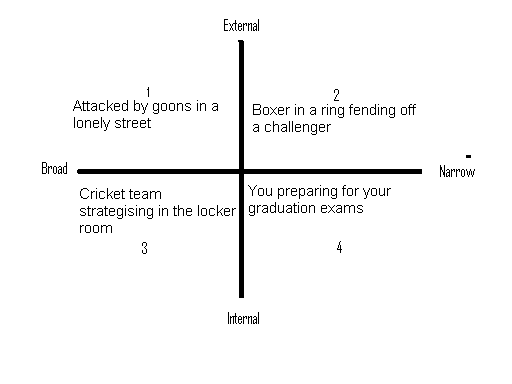 Bsplindia.com
Bsplindia.com Bsplindia.com
Bsplindia.com
|
The path to financial markets "Glory
Avenue" is paved with the corpses of failed traders. Yet, the
lure of mastery over the markets sucks in millions of wannabe
traders into the market ring, to "try their luck." With failure
rates being as high as 95% on a conservative basis, the
temptation to even give it a shot should be astounding to a non
market participant. Yet, newbies come to the market to get a
shot at fame and fortune in the dog-eat-dog world of financial
futures. They admit that it's not for everyone, that the dice is
loaded against the average trader due to the sheer non-material
(mental / emotional / intellectual) resources alone required by
traders. Then there are minor things about trading capital and a
well funded "float" to even justify entering the market. The
hurdles to trading success are many and I pen down my two bits
below later, but first - why is trading (for a living) success
so elusive? Why are failure rates so high? What can you do to
improve your trading performance?
Time element
If you consult a sports coach of
some repute and standing, he will tell you a budding athlete
takes years to "peak out." The advantage of starting early
cannot be emphasised enough, but reaching a peak takes time. For
a trader, peaking would mean your subconscious mind takes over
part of the decision making process once your terminal screen
comes alive at market open. You instinctively "know" what to do.
That level of finesse obviously takes time. How much time - most
performance consultants will tell you it takes approx 10,000
hours or 10 years before anyone hits his peak. In his
performance enhancing classic tome The Road to Excellence,
K Anders Ericsson writes - It takes 10 years of preparation to
become an overnight success. Can you give it that much time?
Skill sets
Trading for a living is a game of
extreme skills. Dr Alexander Elder in his book Trading for a
Living says - Gladiators lived and died in the arena. The
winner gored the loser to death and kept the losers family and
material possessions as prize money. Traders use keyboards and
mice but survive and thrive in the financial futures markets.
The loser is allowed to live with his family, but they must all
suffer the pangs of defeat and humiliation that financial
deprivation brings along.
Skill sets are divided into 4 broad categories and often overlap each other. I present a quadrant depicting external, internal, narrow and broad skill sets. Which skills does a really successful trader ideally possess? Answer - all. Yes, the job is that demanding. Think lightly of it at your own peril, its one of the most demanding jobs in the universe. Anything that requires you to curb your fear and face the markets day in and day out cannot be easy. A non trader will never have the privilege to do battle with himself and the markets and experience the ecstasy that victory brings with itself. 
Mind set
Many have tried convincing me over
the years that trading success depends on internet baud rates,
computer hardware clock speed, software, algos, charting skills,
trading terminal refresh rates etc. etc. While I will concede
that the above do have a hand in determining the success of a
trader, they are a small part even collectively. The traders
mind set is supreme - it makes or breaks the trader. The ability
to think further, deeper, faster and bigger makes the trader a
sharp hunting weapon that he is supposed to be. Heuristics,
biases, conditional reflexive thinking, linear
extrapolation and template method of one-size-fits-all
strategising has killed more traders than they would like to
admit. It takes statesmanship in the thought process to make a
really successful trader.
Attitude
Remember the old saying - Life is
10% what you make it, 90% how you take it. Trading is somewhat
like that. How you act under duress of a crippling loss
determines whether you are fit for this game. Generally
speaking, how we are in personal life determines how we will be
as traders. If you are timid, dominated, nervous, indisciplined
and lazy in personal life, your trades will reflect your
personality traits as well. It WILL show in your profit & loss
account. No hiding from this whatsoever. You see two sets of
people in a diner on a hypothetical working day, during lunch
hour - one guy is punching the keys of his laptop frantically,
biting his lips, sipping water frequently / nervously, while the
other guy is straight faced, punches his laptops keyboard in a
measured, deliberate manner, appears to relax with a cold beer
with his lunch. Which one is a successful trader? The body
language of a successful trader differs from a wannabe trader
like chalk differs from cheese. The successful trader is calm
composed, well fed, content cat who doesnt need to get ruffled
over trifles.
Tenacity
You will run up losses, some big,
some small. Your margin account will deplete by varying degrees
over time. However, your living expenses will inch higher over
time, inflation will guarantee that. Can you live in deprivation
of many comforts that most people take for granted? If yes, how
long before your "nerve breaks" and you dash for the exit door?
It takes courage to stay put in any field and trading is no
cakewalk - you have no guaranteed monthly income, you are a
hunter-gatherer and get to eat only as much as you can hunt - if
at all. Sidney Poiter had this to say about Bruce Willis in the
superhit film The Jackal - "In a business that is
unforgiving, he has prevailed for 23 years and that commands
respect."
Finance
Unless you have a decent "float"
dont even think about trading for a living. You also have to
have a contingency float - what if you fall sick and cant trade?
Do you have spare cash that will feed, medicate you while
trading income is nil? The single largest reason (after lack of
skill) for traders failure is running out of cash because the
float was abysmally small. The ability of life to throw
unforeseen adversities at you should never be taken lightly. If
you have to square up trades to meet financial emergencies, your
finances are wanting. Running up trading losses (which is
inevitable throughout your trading life, but more frequent in
the early phase of your trading evolution), will mean that your
propensity to trade will go down with every loss. Apart from
morale, your broker will also curtail your exposure limits. Keep
your powder dry and cash spare in your bank account. I will
admit that a whole lot of my trading sustainability has been
made possible by my family patiently funding my mistakes and
standing with me during downturns.
Fraternising
Arnold Schwarzenegger attributes a
lot of his success to his training partners in the gym. He says
a right partner motivates you on a lazy day, spots you while you
do heavy lifts and talks you out of a "down" groove. He says
good training partners feed off each others positive energy.
Fraternising with successful full time traders has a similar rub
off. You talk each other into building better trading systems,
trader bigger & sharper and raise your rate of return by a few
basis points every quarter. Try hanging out with losing traders
for a few quarters and share melancholic and depressive
thoughts, your trading account will deplete almost certainly.
Success is contagious, just as failure is - choose who you hang
out with, carefully.
All the best for achieving trading glory ! Vijay L Bhambwani
This piece is dedicated to all my
cherished fellow full time trader friends whose positive
energies upon which I have enriched & feasted my mind. You have
been the wind beneath my wings in my ongoing trading journey.
Deep gratitude.
|
Vijay L Bhambwani